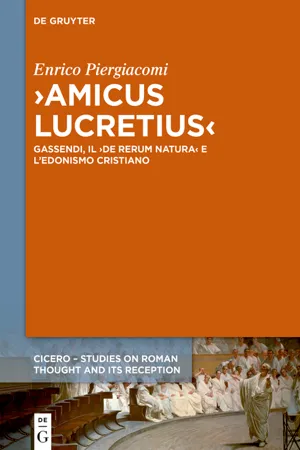
›Amicus Lucretius‹
Gassendi, il ›De rerum natura‹ e l'edonismo cristiano
- 467 pagine
- Italian
- PDF
- Disponibile su iOS e Android
Informazioni su questo libro
Many scholars have studied the dialogue between the Epicurean tradition and Pierre Gassendi. However, no one so far has ever attempted to conduct a full analysis of the latter's specific reception of Lucretius. The book attempts to show that Gassendi was the first to discuss almost the whole De rerum natura, as part of an ambitious project. He sought to provide a Christianized version of Lucretius' theory or to develop an atomistic worldview "freed" from the many dangerous errors that were often imputed to atomism (impiety, debauchery, and irrationality). In particular, Gassendi developed a dialectical strategy that led him to recover a providential atomism, an Epicurean psychology that saves the immortality of the soul, and a Christian hedonism from the De rerum natura. The last goal was especially important. Gassendi here emerges as the culmination of a tradition of Christian philosophers, like Lorenzo Valla and Erasmus of Rotterdam, who have tried to merge Epicurean hedonism with the Christian religion. The volume could therefore attract both scholars of Antiquity and Renaissance/modern philosophy. It is also a rewarding reading for scholars of the reception of Latin poetry from a philosophical perspective.
Domande frequenti
- Essential è l'ideale per studenti e professionisti che amano esplorare un'ampia gamma di argomenti. Accedi alla libreria Essential, che include oltre 800.000 titoli di comprovata qualità e bestseller in vari settori, tra cui business, crescita personale e discipline umanistiche. Include tempo di lettura illimitato e voce standard per la sintesi vocale.
- Complete: perfetto per studenti e ricercatori esperti che necessitano di un accesso completo e illimitato. Accedi a oltre 1,4 milioni di libri su centinaia di argomenti, inclusi titoli accademici e specialistici. Il piano Complete include anche funzionalità avanzate come la sintesi vocale premium e l'assistente di ricerca.
I dispositivi con iOS 13 e Android 7 o versioni precedenti non sono supportati. Scopri di più su come utilizzare l'app.
Informazioni
Indice dei contenuti
- Premessa
- Sommario
- Introduzione
- 1 L’analisi di Epicuro e Lucrezio prima di Gassendi
- 2 Lucrezio il poeta-filosofo secondo Gassendi
- 3 Un atomismo provvidenziale. La fisica di Gassendi
- 4 Lucrezio e Gassendi sulla natura dell’anima
- 5 Dio crea il piacere. Per un «edonismo cristiano
- Conclusioni: Amicus Lucretius, sed magis amicus Christus
- Appendice: Inventario delle citazioni da Lucrezio in Gassendi (Totale: 6249 su 7415 versi = 84,28%)
- Abbreviazioni
- Bibliografia
- Indice delle citazioni da Lucrezio
- Indice delle citazioni da Gassendi
- Indice da altre fonti antiche e moderne
- Indice dei nomi